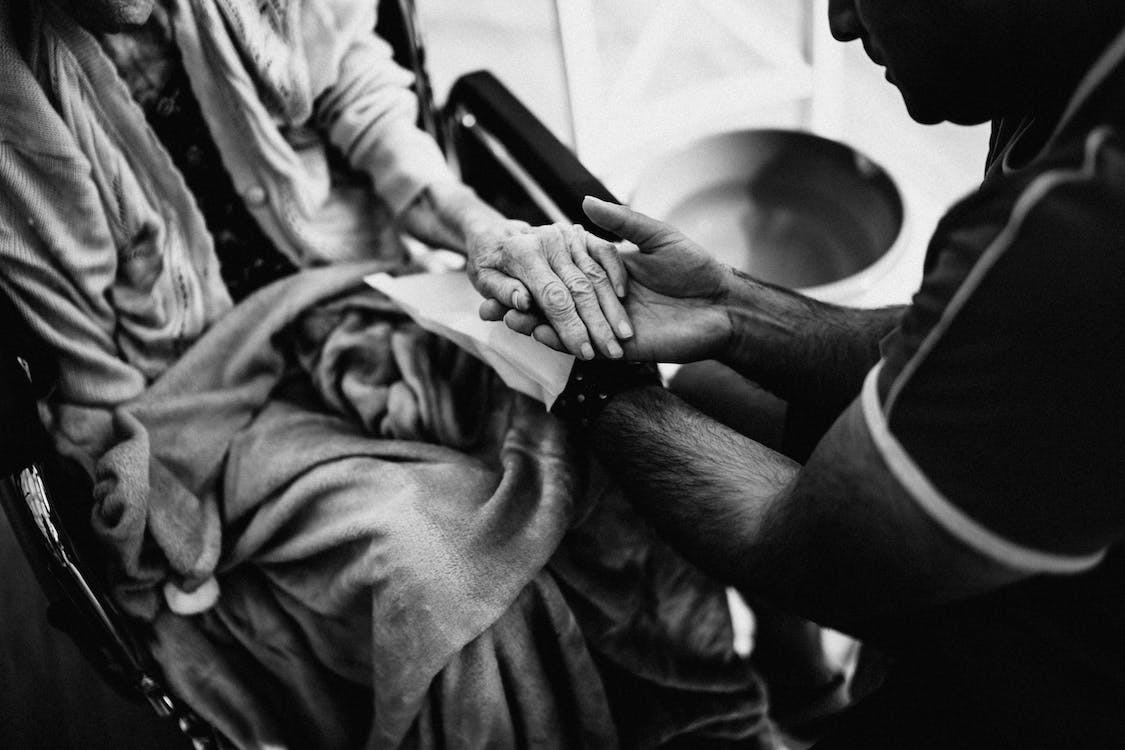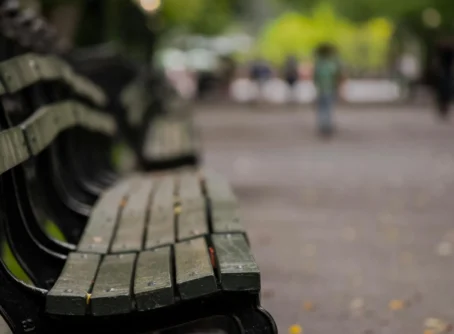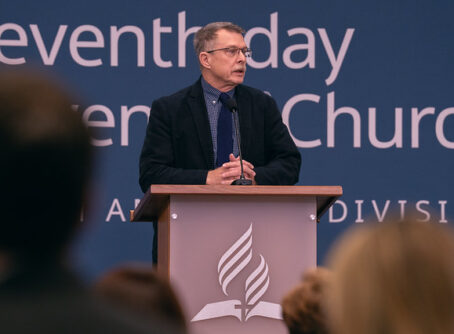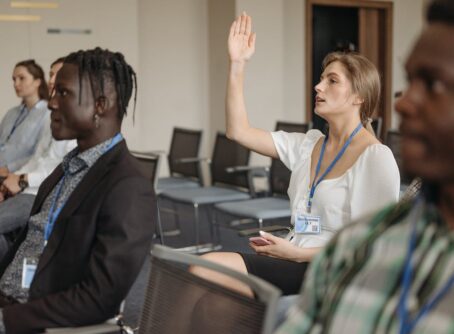
For the last 15 years of her life, my grandmother endured a vicious fight against lymphoma. Like many elderly and/or terminally ill individuals, she had a highly-involved caregiver. That caregiver was my mother. Balancing this role with life’s various demands proved extremely challenging, as my mother shared with me in a recent conversation.
“When you are caring for a loved one with a cancer diagnosis, the last thing you think about is caring for yourself. That seems selfish,” she said. “When my mom was diagnosed with stage IV non-Hodgkin’s lymphoma, I tried to manage caregiving while being a new mom to a six-month-old baby girl and completing my MBA. As my mom’s disease progressed, I was trying to balance being a caregiver, a wife, the mom of two girls and a leader in the workforce.”
While I saw my mom’s role in her mother’s life to be one of beauty and honor, I also saw it as one of pain and heartache. My mom was able to lean on paid time off as well as her mother’s friends — affectionately nicknamed the “Yayas” — for support during this season, but many people in her situation are forced to rely on themselves during their caregiving journey. People should not have to choose between caring for a loved one and taking care of themselves and their own families.
The Current State of Caregiving
The Centers for Medicare and Medicaid Services define caregivers as “family members, friends or neighbors who provide unpaid assistance to a person with a chronic illness or disabling condition.” Caregivers are not only needed by the elderly, although that is the primary focus of this article. Caregivers are an invaluable workforce in our nation’s healthcare system. However, they are often invisible. Despite family caregivers’ crucial role in health care in the U.S., they lack appropriate compensation and adequate support for their work.
The sheer number of caregivers and their expansive, uncompensated services should inspire urgency for a better support system. Most of these caregivers bear additional responsibilities to support themselves, if not also their immediate families. The lack of care for caregivers in the U.S. has manifested in an epidemic of caregiver burnout. Caregivers are exhausted on multiple levels, with no guarantee of rest in the near future.
The reality is that many of us will someday need to care for our own parents or grandparents, or will need to be taken care of ourselves. Some of us will need to become caregivers while we are in our old age and in need of regular assistance ourselves. The repercussions of insufficient care for caregivers reverberate from the family into local communities, workplaces and long-term health care systems. If we remain as observers of this problem, we may eventually lose a crucial resource for optimizing the well-being of our society.
A Calling to Christians
Christians know that God is intrinsically relational — Father, Son and Holy Spirit exist in perfect, eternal relationship with one another. Being made in our Creator’s likeness, we also were made to live interdependently. The fact that we are in relationship with others from the moment each of us enters this world points back to the reality that we are created for community and life together. As members of one body — the Church — we know that to be fully human is to be in relationship with one another and with God.
However, in Western societies, the notion that autonomy is the true essence of the human being and the epitome of human freedom has permeated our culture. However, this is not exactly how we were created to live. To live relationally is to live beyond comfort or convenience. Relationships demand sacrifice, and this principle is not limited to caregivers and beneficiaries, but also applies to those in their communities who are called to bear the burdens of their neighbors. Christians carry the calling of serving our vulnerable neighbors, including our elders, honoring their dignity and advocating for their flourishing. One way we can do this is to encourage churches to partner with the government and the various institutions of society to advocate for the health and well-being of caregivers, so that they may carry out their work wholeheartedly and fully experience the honor of caring for their family.
Care of the elderly and others with debilitating conditions includes the tangible practice of coming alongside them to meet their daily needs. Further, their well-being also requires collaboration between the family, the local church and the broader health care system. Additionally, a just elder care system ensures that the inherent value and dignity of elders is recognized and upheld, which is achieved in part by honoring them as Scripture commands (Exodus 20:12; 1 Timothy 5:1-2; 1 Peter 5:5).
Since a just elder care system is a God-honoring necessity for society, we should know the state of the structures that uphold this system. Caregiving is a unique kind of work, for which its facilitators need particular support. In the case of elder care especially, unlike in many other jobs, the “employee” knows how the journey ends. The caregiver must grieve that ending while still providing care and centering their lives around their family member. If we neglect care for those caring for others, we deny them the right to flourish within their full capacity. As we all are called to serve God and others, we need to take care of each other so we can all live out our callings.
While this issue is deeply personal to anyone involved, a lack of financial support for caregiving from the government proves detrimental especially for people in a lower socioeconomic status, as one study found for caregivers of patients with a physical disability. Another study found that certain racial and ethnic minority groups experience more “time-intensive” caregiving demands than white caregivers. Researchers suggest that this is mainly due to the high percentages of co-residence between caregivers and their beneficiaries in these households. Women also tend to be more deeply affected by the demands of caregiving, both with respect to their career as well as their mental and physical health. As the ones expected in certain cultures and societies to be on the front lines of care, many women face the choice of either caring for their loved ones, or staying in the workforce. The choice may seem obvious, but the reality is that leaving the workforce may create even greater financial strain for women in light of current gender wage discrepancies.
Public Justice Framework
In modern American culture, it is easy to glorify youth and forget the elderly and vulnerable. Ageism, the prejudice against and neglect of older generations, contradicts how God regards the elderly and the vulnerable. Scripture says that our elders possess wisdom and understanding (Job 12:12) and that we are to continue listening to their instruction in their old age (Proverbs 23:22). Furthermore, the government bears the responsibility of promoting the welfare of communities and upholding the common good, without excluding certain populations or age groups based on who society deems as most valuable or “useful.”
The Center for Public Justice’s Guideline on the Family acknowledges that the government must recognize the family as an essential institution in society, and should therefore “aim to uphold the integrity and social viability of families, which do not exist in a social, economic, or political vacuum.” As Christians, we recognize that this institution of the family includes a network of covenantal relationships based on love and trust, which may be strained by financial or emotional burdens. If we truly value these bonds of trust and support within families, we need to do our part as a community to protect those relationships, as they play a vital role in our society.
Role for Government
The government is responsible for the creation and maintenance of a just public order that accounts for the diversity of human responsibility and both serves and equips everyone involved. As articulated in CPJ’s Guideline on Government, the purpose of government is “to uphold a healthy public commons in which the great diversity of human activities — as well as complex social and ecological balances — is maintained for the long-term well-being of everyone.”
Paid family leave is one means by which the government can address insufficient financial caregiver support. It allows families the freedom to exercise care for one another by ensuring the financial well-being of the caregivers. Paid family leave also grants caregivers the opportunity to look into respite care, which 85 percent of American family caregivers do not receive. Respite care may help prevent caregiver burnout, which benefits both the caregiver and the beneficiaries. It can also support beneficiaries at different life stages and with conditions other than terminal illness, such as new mothers needing assistance with their newborns, or children with chronic illness. Paid family leave can support citizens in many different stages of life.
In February of this year, U.S. Representative Don Beyer and U.S. Senator Brian Schatz introduced the Comprehensive Paid Leave for Federal Employees Act, which would offer 12 weeks of paid family and medical leave to federal employees. Currently, the Federal Employee Paid Leave Act allows federal employees paid parental leave, but not unpaid family and medical leave. One article describes one possible impact of the February bill is that “providing paid leave for federal employees would save the government at least $50 million annually in turnover and replacement costs.” Paid family leave not only creates immediate relief for the family directly involved, but for all those who are connected to that family and involved in the caregiving system. Even employers benefit from offering paid leave.
In May of this year, the Center for Public Justice’s Families Valued Leadership Council published a briefing on Paid Family Leave proposing recommendations for a just Paid Family Leave Policy. The Council advised policymakers to “establish a standard, minimum benefit for new parents and end-of-life caregivers,” and “make progress toward a guarantee of at least two weeks of paid health and caregiving leave annually for all who work.” These policies, if adopted into legislation, would help to support caregivers in their meaningful and difficult calling.
Role for Civil Society
As citizens within an interdependent society, we have a unique and beautiful role in bearing one another’s burdens out of a love for Christ and his people. Our Lord has brought us into partnership with him to care for his creation, and thus, we should see our responsibility to help others in their suffering as a gift and an honor.
As members of the local church, we are the ones “on the ground.” We both see and can tangibly act as “first responders” to the immediate needs of caregivers and their families. Even seemingly small acts, like cooking or delivering meals, providing transportation or offering child care services help to alleviate the stress that comes with the family care journey. United Church Homes recently developed a program called NaviGuide to help caregivers and their elderly parents determine the practical needs of a family — what they need to feel supported and guided in their journey. Initiatives like these demonstrate both responsible citizenship and a readiness to be co-laborers for Christ.
Furthermore, as individuals in a democratic nation, we can utilize our right to have a voice in government. To let this suffering of our brothers and sisters go unnoticed or become silenced is to do them a severe disservice in God’s kingdom. CPJ defines responsible citizenship as “helping to shape the political community to conform to the demands of justice.” As members of this political community, we bear both the freedom and the duty to hold our government accountable for its actions — or lack of action — on behalf of its people.
Conclusion
The lack of support for family caregivers not only hurts the caregivers, but it also robs their beneficiaries of the best possible care. As members of communities, churches, schools, workplaces and so much more, we must recognize the critical need for a better support system for this invaluable workforce. While we as individuals can work together to create support networks for caregivers, we must partner with the government, which is obligated to serve by its own defined purpose: to regard the family as an essential institution of society and to create an environment where familial relationships can be characterized by justice and well-being.





